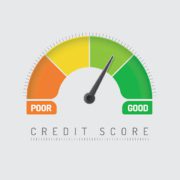Five Ways to Improve Your Credit Score Before Buying a House
House hunting is an exciting time, but before you leap into finding the perfect home it’s important to do the prep work. One of the best ways you can set yourself up for success is by taking a close look at your credit score. Your credit score is key to determining the interest rate you will pay on your mortgage.
Here are five ways you can improve your credit score to get the best rate possible.
Know Your Score
It is a good idea to know your credit score before you take on any big investment. After paying off debt, it can take some time to see the change reflected on your score. This is why we recommend checking your score annually. Visit www.usa.gov/credit-reports for information on how to check your credit report.
Identify and Fix Errors
Once you have your credit report in hand, it is important to take a close look and ensure there are no errors. You want to look at your accounts and balances to verify they are at accurate amounts. Keep in mind it may take a while for balances to be updated on your credit score after a recent payment. If you notice any errors or suspicious activity on any of your credit reports, contact the credit bureau issuing that report and have them correct the information.
Pay Down Debt
Not all debt is inherently bad, but having a lot of revolving debt makes you less appealing to lenders. It is a good practice to pay off as much as you can. At the least ensure you make the minimum payment each month, and if possible, aim for a larger amount. It may be beneficial to consider asking for higher credit limits. Higher limits will improve your credit utilization — if you don’t increase your balance to match.
Don’t Miss Payments
Keeping your accounts in good standing is more important than you think. Even missing a few payments can bring down an otherwise excellent record. Setting up automatic payments using a bank account routing number is the best way to ensure no errors are made.
Limit your Credit Inquiries
It may be tempting to apply for loans and cards due to intriguing bonuses and benefits, but all these applications generate hard credit inquiries. Be mindful of inquiries you decide to opt-in for and be confident that you will be approved. It is important to remember that no matter how tempting, every single inquiry shows up on your credit report and can easily hurt your score.
The more you know about your credit, the easier it will be to work on improving your score. Most credit scores range from 300 to 850 and rank from bad to excellent. Having a higher score shows the lender you are at a lower risk of deficiency and therefore receiving an offer for a lower interest rate. You want to aim for a credit score between 720 and 850.
Each positive action is one step closer to receiving the best interest rate possible and landing your dream home!




 These loans are backed by the Federal Housing Administration (FHA). This type of loan may be more attractive to someone who has less than perfect credit. They require a down payment of at least 3.5% of the purchase price.
These loans are backed by the Federal Housing Administration (FHA). This type of loan may be more attractive to someone who has less than perfect credit. They require a down payment of at least 3.5% of the purchase price.

 A mortgage is a loan, and like other bank loans, it comes with an interest rate – it’s how lenders make enough money to stay in business. This is usually a percentage of the loan amount, and you pay it off alongside the
A mortgage is a loan, and like other bank loans, it comes with an interest rate – it’s how lenders make enough money to stay in business. This is usually a percentage of the loan amount, and you pay it off alongside the 
 You can enter the market sooner. In today’s market, it’s all about speed and strength. Having a co-borrower added to your mortgage application can increase your buying power and help you enter the competitive market with your best foot forward.
You can enter the market sooner. In today’s market, it’s all about speed and strength. Having a co-borrower added to your mortgage application can increase your buying power and help you enter the competitive market with your best foot forward.
 When you’re considering a mortgage, your first thought is probably “Can I afford it?” A mortgage lender asks themselves a similar question: “Will this person be able to repay the loan?” To the lender, giving you a mortgage is a risk, no matter how great your credit history is or how much money you make. To offset some of the risk, lenders charge interest on the mortgage.
When you’re considering a mortgage, your first thought is probably “Can I afford it?” A mortgage lender asks themselves a similar question: “Will this person be able to repay the loan?” To the lender, giving you a mortgage is a risk, no matter how great your credit history is or how much money you make. To offset some of the risk, lenders charge interest on the mortgage.
 VA Home Loan Benefits
VA Home Loan Benefits #2: Know what you can afford
#2: Know what you can afford
 Most people assume that their Credit Karma score is their universal credit score when applying for a home or auto loan. When their true mortgage credit score is pulled by their Loan Officer, shock and anger typically follow. Why are they different? Did the Loan Officer pull the wrong score?
Most people assume that their Credit Karma score is their universal credit score when applying for a home or auto loan. When their true mortgage credit score is pulled by their Loan Officer, shock and anger typically follow. Why are they different? Did the Loan Officer pull the wrong score?